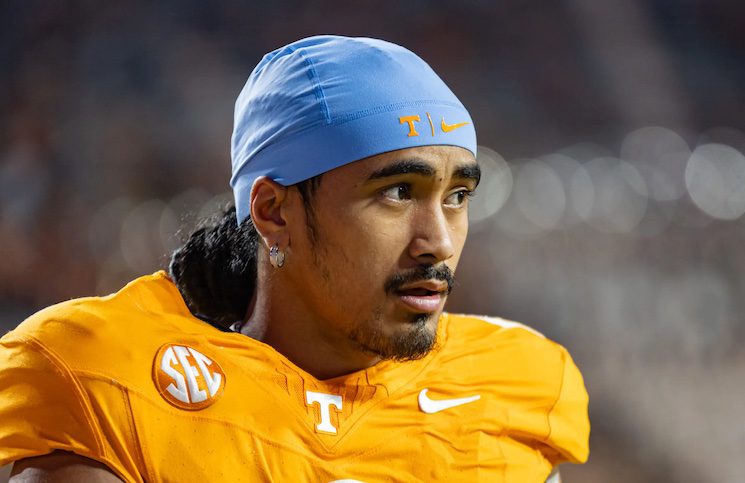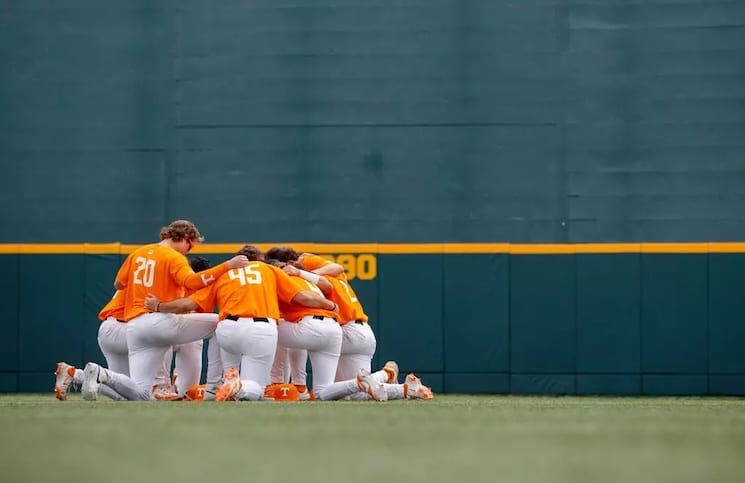
Tennessee head coach Jeremy Pruitt has gained a reputation as a defensive mastermind. And rightfully so. Before being hired as the Vols’ new head football coach, Pruitt served as a defensive coordinator for five years at three different stops. And all three of those schools — Florida State, Georgia, and Alabama — reaped the benefits of Pruitt’s work.
Pruitt’s defenses have been some of the best in college football over the last five years. But what’s the key to Pruitt’s success as a defensive coach? Is it focusing on stopping the run? Relentless pressure on the quarterback? Dominant front seven play?
According to data from David Hale of ESPN, Pruitt’s success might actually come from his defense’s ability to force turnovers.
Hale took an in-depth look at how turnovers shape the college football game in a recent article. He dove into what exactly makes some teams really good at forcing turnovers, why turnovers might be more based around luck than you might think, and the underlying factors for teams who excel at disrupting opposing offenses.
And according to Hale’s research, nobody has been better at making opponents turn the ball over than teams coached by Pruitt.
“Every data set has its outliers, and when it comes to takeaways in college football, the man standing on the far end of the bell curve is Tennessee coach Jeremy Pruitt,” writes Hale. “If luck is the determining factor in turnovers, Pruitt’s got a pocketful of four-leaf clovers.”
Year in and year out, Pruitt’s defenses have been among the nation’s best at taking away the football from opposing offenses. Alabama was second in the SEC last season and tops in the conference in 2016 in most turnovers forced, and his Georgia squads finished fourth and third in the SEC in 2015 and 2014 respectively. Pruitt’s 2013 Florida State team forced the second-most turnovers in all of college football, tallying 35 takeaways.
In fact, over the last five years, no single team has forced more turnovers than the defenses Pruitt has led.
“In that span, Washington leads all Power 5 programs with 136 takeaways. But add up each of Pruitt’s stops — Florida State, Georgia and Alabama — and he’s got even more, 139,” Hale states. “His defenses exceeded the Power 5 average in takeaways every season, and he ranked in the top 10 three times. At each new stop, Pruitt increased takeaways from the prior regime by an average of nearly 10 per season.”
But how has Pruitt been able to get his teams to consistently force teams to cough up the ball? How has he become such an outlier in college football? Hale says it goes beyond simply being lucky.
“(Pruitt) can list off plenty of reasons,” Hale continues. “He’s had great athletes. He stresses putting pressure on the quarterback, something that, as offenses increasingly add run-pass options to their playbooks, makes for even more takeaway chances. And he asks his defenses to be aggressive, to dictate the action rather than respond to it.”
Pruitt has been known for his aggressive play-calling as a defensive coordinator over the last half decade despite traditionally running a 3-4 defense as his base. A 3-4 defensive scheme is typically more about controlling offenses and reacting rather than aggressively attacking an offense and making them react to the defense.
But Pruitt differs in that regard. And the results speak for themselves.
Pruitt’s defenses over the last five years have all finished in the top 16 in the FBS in points allowed per game every season and in the top 17 in the FBS every year in yards allowed per game. And that goes along with their outstanding ability to force turnovers.
The first-year head coach will have his work cut out for him at Tennessee, however. The Vols were tied for 97th in the FBS last year in takeaways, forcing only 15 turnovers all season. Tennessee failed to force a turnover in five of the 12 games they played last year. Not only that, but Pruitt doesn’t have the players on UT’s defensive roster who fit his system entirely yet.
Only five of Tennessee’s opponents in 2018 were in the top 50 in fewest giveaways in 2017, so the Vols might be able to take advantage of some teams who give the ball away more this upcoming season. They didn’t take advantage last season, but they also didn’t have Pruitt coaching their defense.
Pruitt will be tested like never before this upcoming season, but his track record has to make Vol fans optimistic that 2018 will be a more successful year on defense for Tennessee than the last couple seasons.




